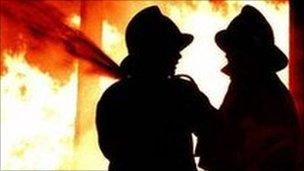Dozens died in fires in 2010 'despite fire alarms'
- Published

More than 80% of buildings now have smoke alarms fitted
Nearly half of fire deaths in buildings in 2010 happened in a property with a working smoke alarm, figures obtained by 91»»±¨ Radio 5 live Breakfast show.
The deaths accounted for 157 of the 340 people killed in UK property fires.
The figures were obtained through Freedom of Information requests from 54 out of 57 fire services.
The Fire Brigades Union said fire alarms had helped to reduce fatalities but the figures showed it was wrong to cut back on firefighters.
More than 80% of buildings now have smoke alarms fitted.
But people often disable them if they are faulty and go off too frequently or they forget to replace the batteries.
In many cases where deaths occurred last year, even though there was a working fire alarm, escape routes had not been planned or exits were blocked.
In about 40% of fatal fires alcohol was a contributory factor because people were either unable to hear or respond when the alarm went off.
Rob Davies, community safety officer for West Midlands fire and rescue service, said a smoke alarm could only give early warning in event of a fire.
"About 60% of house fires are caused by fires in the kitchen. But when you come onto fatalities and fire deaths, it's slightly different. In fact, with 40% of fire fatalities there has been some involvement with alcohol."
'7,000 rescued'
Matt Wrack, general secretary of the Fire Brigades Union, said it was crucial to remember that firefighters rescued 7,000 people a year from fires.
"Smoke alarms are not and cannot be a replacement for firefighters. Too many fire services have used the fitting of smoke alarms to justify cuts to their local fire service, and these figures show why that is very wrong."
Sheila Merrill, from the Royal Society for the Prevention of Accidents, said many people who had died had not heard alarms as they had been in a deep sleep due to medication or alcohol.
"In some instances, they could have heard the alarm but their exit out of the house is actually blocked by the fire, so they're still unable to get out.
"And what we have to remember is that nine times out of 10, it's not the fire that kills you, it's the smoke."
The government's chief fire and rescue adviser, Sir Ken Knight, said easy additions to normal routines, such as testing a smoke alarm, could help add vital extra seconds when it came to escaping a fire.
"Simple checks such as closing doors every night and avoiding overloaded plugs will help reduce the risk in the home. If the worst should happen, everyone should make sure they are prepared and have an established and practiced escape route in place," he said.